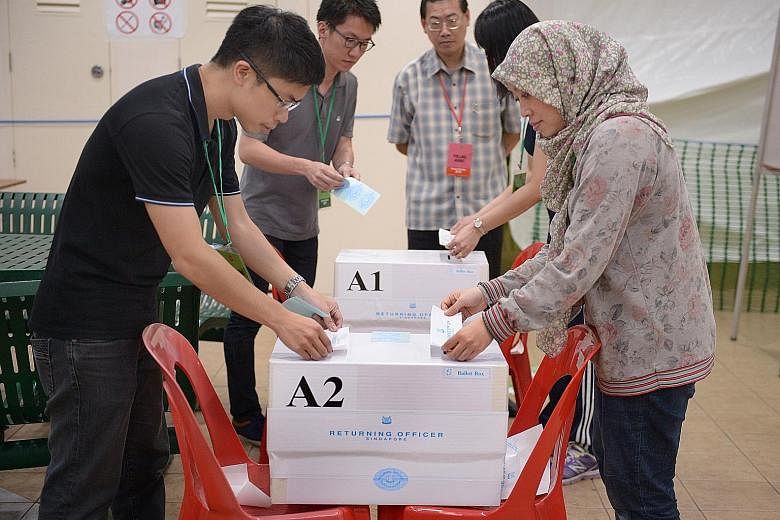When a sealed ballot box is lost or destroyed before the ballots can be counted, election officials can abandon the vote count for the affected polling station, under changes proposed in Parliament yesterday.
And should the number of votes in the particular polling station be enough to sway the electoral result for that constituency, the voters in the polling station must undergo a fresh poll, said the Parliamentary Elections (Amendment) Bill.
The Elections Department (ELD) later told The Straits Times that in the past several elections, no sealed ballot box had been lost or damaged before the ballots were counted.
The suggestion is one of about 30 changes being introduced to improve the administration of elections, with the new rules, if approved by Parliament, likely to take effect before the next general election, which is due by 2021.
The Bill was introduced in Parliament by Trade and Industry Minister Chan Chun Sing, a former minister in the Prime Minister's Office.
Another change sets out the election procedure in the event of contingencies such as riots, fires and floods, ELD said in a fact sheet issued to the media.
-
Some recommended changes in the Parliamentary Elections (Amendment) Bill
-
•ELD can reject, without having to hold a public inquiry, a claim to be included in the Register of Electors if the claim is clearly without merit, such as if the claimant is not a Singapore citizen or is below 21 years old on the relevant cut-off date.
•Only aspiring candidates who meet the following conditions are permitted to enter the nomination place: If they are issued a political donation certificate and, if relevant, a minority community certificate. They must also be accompanied by a proposer, a seconder and four assentors.
•The Returning Officer can provide 17 days, from 10 days currently, for overseas votes to reach Singapore for counting if the number of votes is material to the election outcome.
•To protect personal data, details such as addresses and contact numbers, which are included in the returns on election expenses, will be redacted when these returns are opened for public inspection. Identity card numbers will also be partially redacted.
•The adjudication of disputed votes will disregard any marks made outside the demarcated area of the ballot paper by the voter. Currently, election officers have to consider marks made on the entire ballot paper in cases of disputed votes.
•Candidates and their agents need not apply for a vote recount, as it will be carried out if the difference in the number of votes between the top candidate and any other candidate contesting the same election falls within the limit of 2 per cent or less.
Ng Jun Sen
The Bill allows the Returning Officer to suspend proceedings for up to two hours to assess the situation and decide on the course of action.
He can change the time and place of the nomination if a disruption were to happen on Nomination Day, for example, but the proceedings must still take place on the same day. Notice of his decision will be published in the Government Gazette. Maps of the various polling districts can also be published on the ELD website, replacing the current method of using textual descriptions of road boundaries in the Gazette.
The Bill also allows candidates to use electronic fund transfer systems to pay their election deposits, while cash payment can be accepted only if the Returning Officer allows it.
Around 20 per cent of candidates paid their deposits in cash in the previous general election.
Payment by bank draft and certified cheque, which are now allowed, will continue to be available.
Candidates and their election agents, who have been submitting receipts and bills of their election expenses to ELD, will no longer need to do so, but are required to keep these documents for a specified period of time and allow them to be checked.
"This will make it more convenient for candidates without diluting accountability," ELD said.
The formula to compute the election deposit will be simplified and based on an elected MP's monthly allowance, which is now $13,750, rounded to the nearest $500.
Currently, the election deposit is set at 8 per cent of an MP's total annual allowance.
People prohibited from conducting election activities, such as primary and secondary school students, foreigners and undischarged bankrupts, will also not be allowed to prejudice the electoral prospects of another political party, candidate or group of candidates.
Currently, the law only states that people in this prohibited category are not allowed to promote or aid candidates in non-clerical work.
ELD said the Bill also brings the Parliamentary Elections Act in line with recent changes to the Constitution, which was last amended in 2016, and the Presidential Elections Act, which was changed last year.
These changes include increasing the number of Non-Constituency MPs from nine to 12, minus the total number of elected opposition MPs.
The Returning Officer can also provide 17 days, up from 10 days now, for overseas votes to reach Singapore for counting if the number of votes is material to the election outcome.


